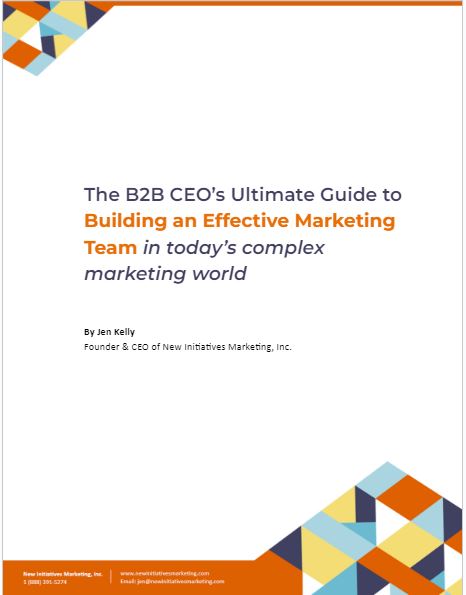Running a small consulting engineering firm requires careful navigation of numerous challenges, particularly when it comes to winning RFPs and attracting talent. You already know how competitive the industry is. Your technical expertise and years of experience have brought you success, but today’s market demands more. You may have heard of “content marketing” and wondered if it’s relevant to your firm, especially when you’ve managed just fine without it so far.
The truth is, that marketing may seem like a soft, “nice to have” investment compared to the hard skills of engineering, but it plays a significant role in growing your business. Investing in content marketing can enhance your visibility, position your firm as an industry leader, and help you build relationships that lead to more business.
This article will explore why content marketing is not just relevant but essential for small consulting engineering firms and how it can complement your efforts to win RFPs and attract top talent.
Why the Skepticism About Marketing?
It’s easy to be skeptical about marketing. As a consulting engineer, you’ve built your business on measurable outcomes and real-world expertise, not flashy campaigns, logos on coffee cups, SWAG at trade shows or viral videos. You might ask: “Why would content marketing matter for a firm like ours? Isn’t our reputation enough?”
These concerns are valid. Many small firms have relied on the same clients and networks for years, and it’s worked well enough. However, as the industry evolves and competition becomes fiercer, visibility and credibility take on new importance. The reality is, that in a crowded market, even the most skilled firms struggle to stand out. Without a focused marketing strategy, your expertise might remain hidden from potential clients and future employees who are actively searching for firms like yours.
What is Content Marketing and How Does It Work?
Content marketing, in its simplest form, is about creating and sharing valuable content (this means written and visual information) that addresses the needs and interests of your audience. For a consulting engineering firm, this could mean publishing technical white papers, sharing case studies that showcase successful projects, highlighting the expertise of your project managers or offering insights through blogs on industry trends and challenges. The goal isn’t to aggressively sell your services, but to establish your firm as a trusted resource and eventually, an industry thought leader.
Here are a few ways content marketing works:
- Establishing Authority: When you publish content that demonstrates your expertise, whether it’s a white paper on new building regulations or a blog post about sustainable engineering solutions, you position your firm as informed and knowledgeable in the field. This authority is crucial when potential clients are choosing between firms—being recognized as an expert can tip the scale in your favour.
- Increasing Visibility: High-quality content published on your website, social media platforms, or industry forums increases your firm’s visibility. More people will find you through online searches, and this expanded reach can attract not just clients but potential employees too.
- Building Trust: Content that educates and informs rather than sells builds trust with your audience. By providing valuable information for free, you prove that your firm is a reliable and knowledgeable partner, which can make a significant difference when you’re competing for RFPs.
- Engaging a 24/7 Audience: Unlike networking events or client meetings, content marketing works around the clock. A potential client searching for information on a specific problem at any hour can stumble upon your blog or case study, giving your firm an edge even when you’re not actively pursuing leads, deals or meetings.
Content Marketing in Action: What Should Your Firm Focus On?
It’s important to be strategic about what kind of content you produce. For small consulting engineering firms, the following types of content tend to be most effective:
- White Papers: Technical reports or white papers offer in-depth insights into complex engineering topics. For example, a white paper that outlines solutions for handling extreme weather in infrastructure projects can position your firm as an expert in the field, could contribute to making you a preferred choice for clients needing that expertise.
- Case Studies: Case studies allow you to highlight past successes tangibly. They show potential clients how you’ve solved similar challenges for others and what results you’ve achieved. This type of content is particularly useful when bidding for RFPs, as it demonstrates a track record of delivering on promises. If you can’t always get a client-named case study, generic case studies do work better than not having any. Many people understand not all clients are comfortable lending their logo to a piece of vendor content, those same people know that it is important to promote past work. Don’t let this stop you.
- Blog Posts: Regularly updated blogs can cover a wide range of topics, from technical innovations to industry trends. By offering bite-sized insights, blogs keep your firm top of mind for anyone following the industry.
- Public Speaking and Industry Engagement: Public speaking engagements, whether in person or via digital channels like podcasts or webinars, are another effective way to demonstrate leadership. Being seen as a go-to expert can directly impact your success in RFP pursuits by boosting your credibility.
Does This Really Work? Measuring the ROI of Content Marketing
Marketing might seem like an abstract investment, especially compared to the clear-cut results of engineering projects. But content marketing is measurable, and its success can be tracked through tangible outcomes. However, it will take time. Don’t expect a 30-day or 3-month windfall of new clients as a result of a few posts on social media. You’ll have to be strategic about marketing supporting your business. However, here’s how you can evaluate its effectiveness:
- Increased Website Traffic: One immediate metric of success is increased traffic to your website. More visitors mean more potential clients who are aware of your services.
- Higher Quality Leads: Content marketing tends to attract higher-quality leads because those who engage with your content are already interested in what you have to say. They’re likely to be more informed and aligned with your expertise by the time they contact you.
- Improved RFP Success Rates: The more you position your firm as a trusted expert, the better your chances of being shortlisted for projects or invited to projects you were not invited to previously. Firms that consistently produce valuable content are often seen as lower-risk partners in the eyes of potential clients.
- Enhanced Employee Attraction: It’s not just clients who are searching for credible firms—potential employees are too. A firm that publishes thought leadership and showcases its innovative work is more likely to attract top talent.
How to Get Started with Content Marketing
If you’re still unsure about diving into content marketing, start small but do stay consistent. You don’t need to overhaul your entire view on marketing overnight. Begin by selecting one or two areas to focus on—perhaps publishing a weekly blog post or once a quarter committing to publishing a case study on a successful project. Over time, as you see results, you can expand your efforts to include white papers, video content, and public speaking opportunities (live speaking, podcasts and media interviews can be turned into effective content for your company’s marketing too).
Additionally, you don’t have to handle content marketing internally. There are marketing companies that specialize in helping small engineering firms create effective, industry-specific content. Consider working with experts who understand the nuances of your business and can help you build a strategic marketing plan that aligns with your firm’s goals – and then has the resources to execute it consistently for you.
Marketing as an Investment in Your Firm’s Future
Your small consulting engineering firm has come this far based on technical skill and reputation, but the market is changing. Investing in content marketing is about ensuring that your firm continues to thrive in a more competitive landscape. It allows you to share your expertise, enhance your visibility, and win the trust of potential clients and employees.
If you have any questions about this blog post or would like to schedule a consultation with Jen Kelly, NIM’s Founder and one of the Fractional CMOs to get more guidance around your next steps in marketing, you can send her an email or book a consultation time.
Jen Kelly leads New Initiatives Marketing, Inc., a Fractional CMO & Expert B2B Marketing Team company. Since 2009, our team of senior marketing leaders and expert marketing specialists has been helping B2B CEOs with the strategic leadership and real-world marketing execution needed for practical, long-term results.


